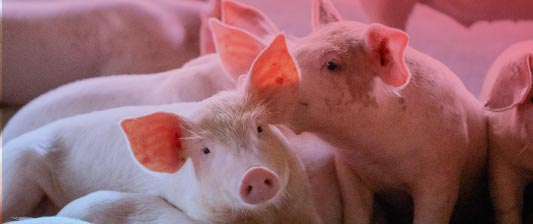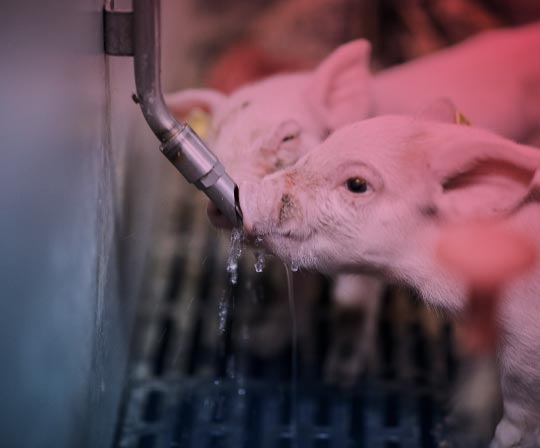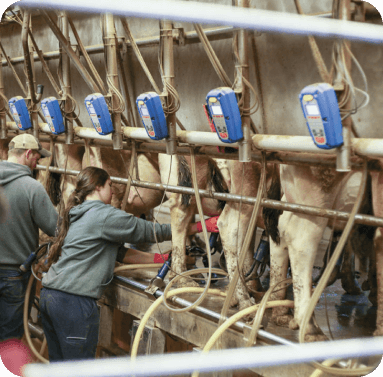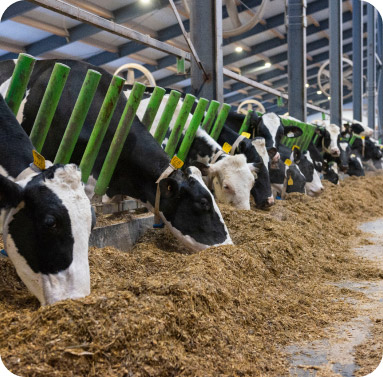Enhancing Swine Welfare and Production
with Management & Nutrition during the Summer
As summer approaches, the consequences of heat on pig health, productivity, and reproduction become a major concern for farmers. With weather getting hotter around the world, do not wait until the thermometer hits 30°C to implement changes as heat stress can occur at temperatures as low as 23°C if the humidity exceeds 75%. Finding ways to help pigs to stay cool and healthy is more important than ever.
How Does Heat Stress Affect Your Pigs?
In the hot days, animals tend to eat less, drink more and reduce their activity. Inadequate nutrition weakens the immune system, making pigs more vulnerable to infections and diseases. Also, when pigs are exposed to high temperatures, their metabolic rate increases and, to dissipate heat, the body diverts energy away from growth, consequently reducing weight gain and increasing time to market.

Heat stress can also significantly impact reproductive performance as it can disrupt normal estrous cycles in sows, leading to irregularities in heat detection and conception rates. Heat-stressed boars may exhibit reduced libido and semen quality, further complicating breeding programs and potentially affecting genetic progress within the herd.
Preventive Maintenance Is Key
For an efficient farm operation, checking ventilation, cooling and water systems is essential. Accumulated dust can significantly reduce air circulation efficiency, increasing energy consumption by over 30%. Defective sprinklers can reduce the capacity to control the temperature in the barn, and uncleaned water lines with biofilm or mineral deposits are a risk to the animal’s health. Furthermore, reducing stocking density is another way to promote a healthier barn environment, potentially improving overall well-being.
Liquid Supplements to the Rescue
One of the best ways to help your animals to deal with the heat is by adding special additives to their feed, which may include nutrients in both liquid and powder formats.
To compensate for lower feed intake, liquid blends of vitamins can boost their health and, thus, maintain their performance despite the high temperatures. There are many advantages to adopt nutritional supplementation through the drinking water during critical life stages. Liquid supplements allow for precise dosage control and uniform distribution among animals, are easy to use, minimize waste and optimize nutritional intake. They can also be quickly adjusted to the animals’ diet based on their changing nutritional needs.

The Role of Enzymes
Another excellent strategy is using enzymes alone or combining several of them to benefit of a synergistic effect on swine health and production. Here you will find the action mode of the three most used enzymes:
- Xylanase breaks down complex carbohydrates found in plant cell walls into smaller sugars, increasing the digestibility of vegetal origin ingredients like wheat, barley, and corn, commonly used in swine diets, and making more energy available to the animal.
- Beta-mannanase complements the action of xylanase by contributing with the energy utilization from feed ingredients such as soybean and palm kernel meal. The combination of beta-mannanase and xylanase helps compensate energy intake for the reduced feed intake typically observed during heat stress.
- Protease hydrolyses proteins into smaller peptides and amino acids, improving protein utilization from ingredients like soybean meal, which may contain anti-nutritional factors that hinder protein digestion. This allows to reduce crude protein levels in feeds and therefore helps animals to reduce the heat production associated to protein digestion. From an economic standpoint, it allows for reduced protein content in feed, cutting overall costs, while from the health and performance standpoint, it promotes growth and gut health, reducing undigested proteins that could otherwise feed harmful bacteria.
Conclusion
In summary, effectively managing heat stress on pig farms demands a strategic approach to feeding, ensuring that animals receive essential nutrients in the most readily available form for optimal absorption. By addressing the challenges of reduced feed intake during heat waves with liquid supplements and enzymes, farmers can support overall health and performance of their herds. This synergistic strategy enables farmers and animals to achieve more with less.
For more advice and tailored solutions, please talk to your Jefo representative.
your rep to
call you back



